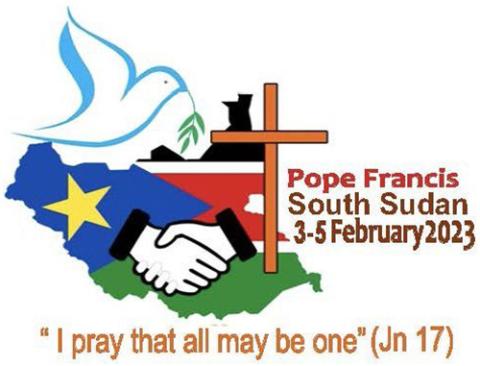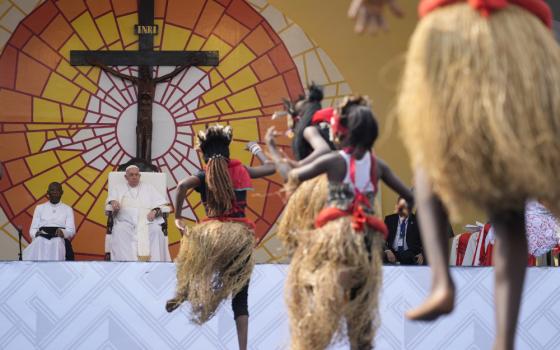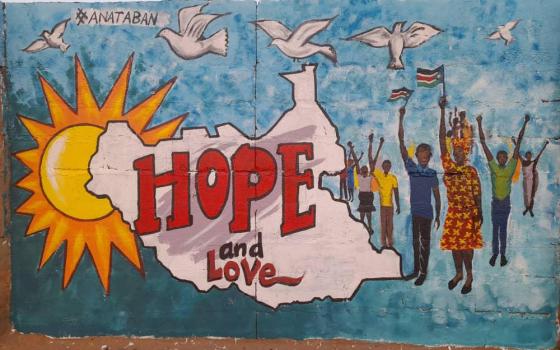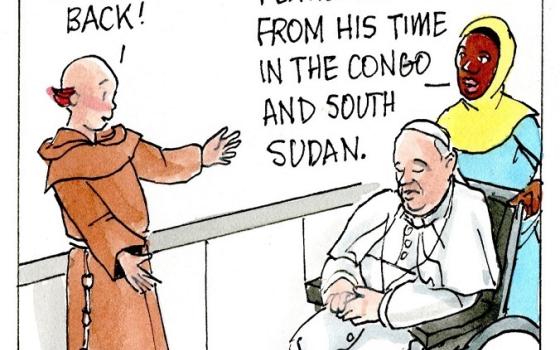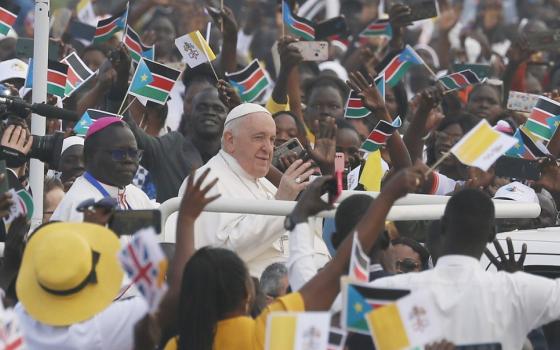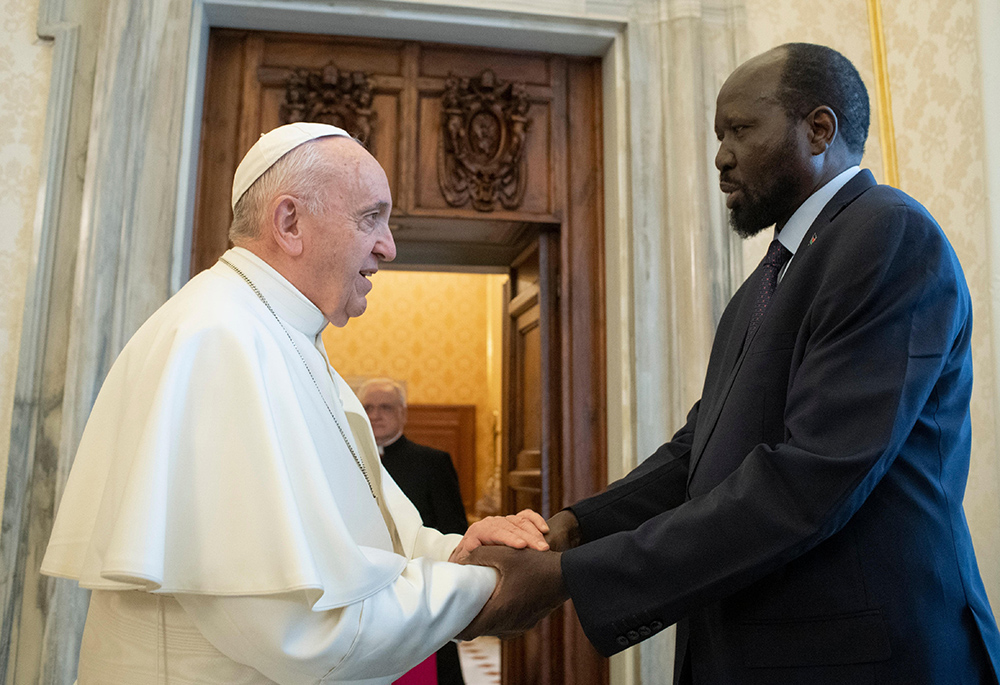
Pope Francis shakes hands with South Sudanese President Salva Kiir during a private audience March 16, 2019, at the Vatican. The pope will visit South Sudan Feb. 3-5, on a trip that will also take him to Congo. (OSV News/Vatican Media)
As Pope Francis prepares to arrive Feb. 3 in South Sudan's troubled capital, religious sisters hope that his visit will stir political leaders to finally come together and agree to restore peace to the youngest country in the world.
"The papal visit will, first of all, be a source of consolation to the brokenhearted and heal the wounds caused by war and the uncountable conflicts in the country," said Sr. Fulgence Aninayote, a member of the Missionary Sisters of the Blessed Virgin Mary in South Sudan. "I also expect that the pope's message will bring true understanding to the people that by God's grace, peace is possible, and it is through peace that development and evangelization can take place and make the country more beautiful."
In December 2013, the East African landlocked nation of more than 10 million people descended into a bloody civil war following a political struggle between President Salva Kiir and then-Vice President Riek Machar that resulted in Machar's removal as vice president. The army aligned themselves along ethnic lines: soldiers from the Dinka ethnic group supported Kiir, while those from the Nuer ethnic group supported Machar.
The violence spread rapidly across the country, resulting in tens of thousands of deaths and more than 4 million citizens fleeing their homes. Soldiers from rival factions also raped women and children, recruited children in their ranks, and destroyed properties, including schools, markets, churches, and government buildings.
In September 2018, Kiir and Machar signed a peace deal, reinstating Machar in his former role as vice president. However, efforts to implement some sections in the peace deal failed —including the formation of a transitional government of national unity, integration of a trained unified army, and the demarcation of borders between states — continuing the war's ongoing violence and conflict.
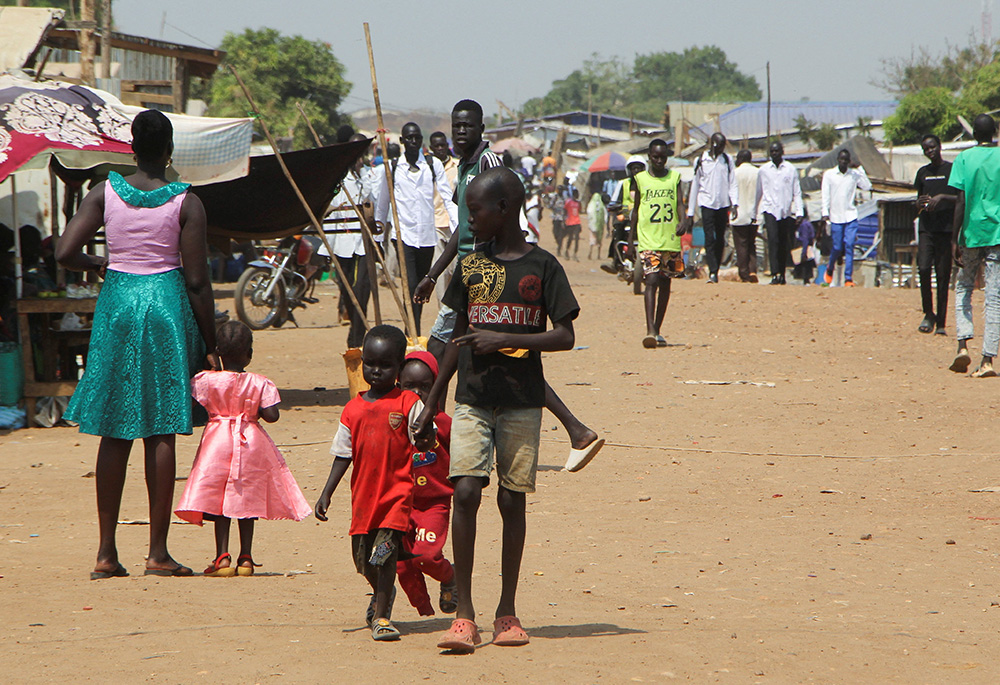
Internally displaced civilians are seen walking Jan. 23 at a Protection of Civilians site in the United Nations Mission in South Sudan compound outside Juba ahead of Pope Francis' Feb. 3-5 visit to South Sudan. (OSV News/Reuters/Samir Bol)
Nevertheless, South Sudan's nuns believe that the Holy Father's presence will help bring all warring factions together and negotiate for peace for the betterment of South Sudanese people.
According to the Vatican's itinerary, the 86-year-old pontiff is expected to visit the Democratic Republic of Congo from Jan. 31 to Feb. 3, and then spend two days in South Sudan before returning to the Vatican. While in Juba, Francis and his delegation will meet Kiir and Machar, politicians, diplomats and civil society.
"We have been awaiting this historic event for quite a time, and it is just about to happen on the soil of the youngest nation in the world," said Aninayote, a South Sudan native who has ministered there for more than two decades. "By God's grace, everyone expects the papal visit to see the warring parties coming together and finally resolving their differences to bring lasting peace to the country."
Advertisement
In the Democratic Republic of Congo, President Félix Tshisekedi is expected to receive Francis at the National Palace in Kinshasa, the country's capital, Jan. 31. He will later meet with the authorities, civil society representatives, and the diplomatic corps.
The following day, the pope will celebrate Mass at the Ndolo airport in Kinshasa and then meet with victims of the violence in the east of the country. The central African nation of 95 million people, nearly half of which is Roman Catholic, has experienced continuous violence carried out by armed groups, especially in eastern Congo, resulting in the deaths of hundreds and mass displacement of millions of people.
Cardinal Fridolin Ambongo, Archbishop of Kinshasa, told journalists that Francis would meet with young people and catechists Feb. 2 at Kinshasa's Martyrs' Stadium before heading to Juba. "There is a lot of joy, expectation and enthusiasm from the people as we expect for the arrival of Pope Francis."
In April 2019, Francis surprised all when he knelt down and kissed the feet of Kiir and Machar during a two-day spiritual retreat at the Vatican. He also kissed the feet of Rebecca Nyandeng, wife of former leader John Garang, and Taban Deng Gai, one of the vice presidents of South Sudan in the unity government.
Sr. Beta Almendra said Francis' gesture is still remembered in South Sudan today, and that his coming is a reminder and inspiration to the country's political leaders to finally restore peace. Almendra, a Comboni Missionary sister living in Wau, a city in northwestern South Sudan, revealed that the country is still in a serious humanitarian crisis with no schools, hospitals, churches, markets and infrastructure. She said people were still fleeing their homes due to insecurity, and camps were overcrowded with refugees without government and international community support.
"The coming of Pope Francis means a lot to the people of this country because there is a huge expectation that his presence will make the leaders commit to making peace and ending conflict affecting the people of this country, especially women and children," said Almendra, originally from Portugal and serving her second missionary experience in South Sudan after having served in Kenya. "I am worried about the next generation because they haven't known peace and have not accessed any formal education to help them become future professionals."
Sr. Jacinta Habiba Dagbaaboro, superior general of the congregation Our Lady Queen of Peace, said the coming of Francis was a dream come true to the people of South Sudan who have longed for peace since the civil war broke out.
"The pope's coming to this country is a blessing to us," said Dagbaaboro, who lives in the Tombura-Yambio Diocese in the Western Equatoria state of South Sudan, bordering the Central African Republic and the Democratic Republic of Congo.
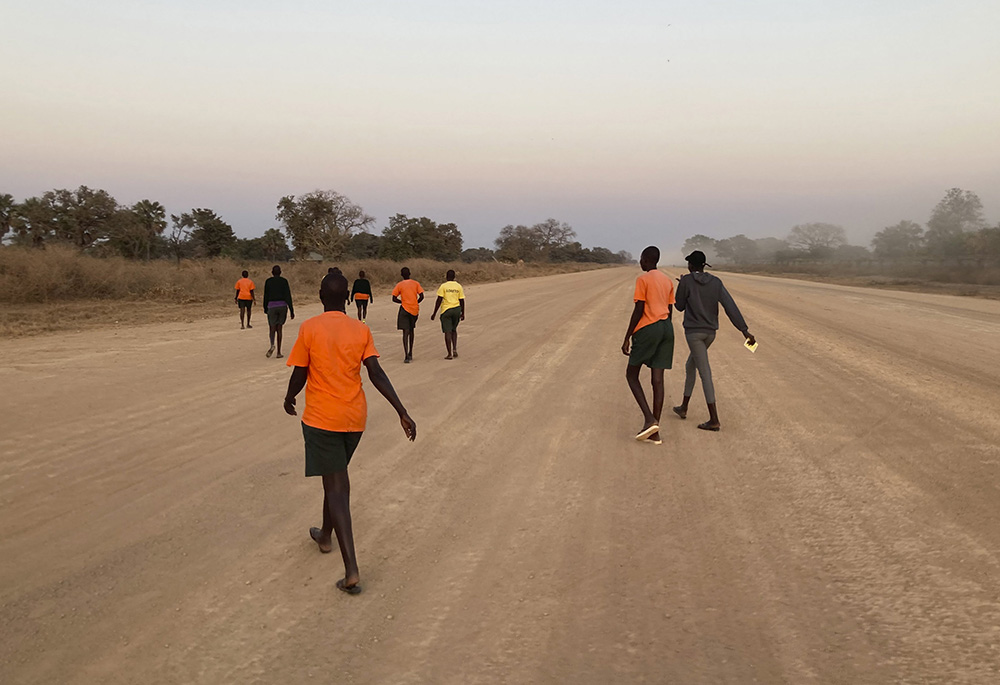
Students and interns from Loreto Secondary School participate in a training walk Jan. 14 in Rumbek, South Sudan, as they prepare to join others from the Diocese of Rumbek on a nine-day pilgrimage, walking to Juba for the Feb. 3-5 visit of Pope Francis. (CNS/Courtesy of Sr. Orla Treacy)
"As religious, we have prepared to go to Juba to meet him. The expectations we have as religious are very high. We have been praying for this for a long time, and now that the time has come and he is coming, we see it as Christ himself visiting us to put a stop to our suffering."
Dagbaaboro lamented that their ministries, which are meant to help the vulnerable population across the country, had been halted due to violence and insecurity. She appealed to the armed groups to lay down their arms for the sake of peace in the country.
"Every aspect of life has been affected: people have died, others have been displaced, and poverty is very high," she said, noting that her congregation had to close their school due to insecurity, as well as relocate the motherhouse following a series of attacks.
Meanwhile, residents believe that the historical coming of the Holy Father is the only solution to finding lasting peace in the country.
"We are anxiously waiting for the pope to come because he is the only hope we have right now," said Tueng Ruac, a refugee living with his family in Mangaten camp in a suburb of Juba. "If our leaders fail to listen to the Holy Father's advice to restore peace, then we will have no country after he leaves."
The 49-year-old took refuge at the United Nations camp, just a few miles from his home, in search of safety barely a month after the civil war erupted in 2013.
"We have longed to return to our homes, and failure to find peace will leave most of us heartbroken and only waiting to die."

